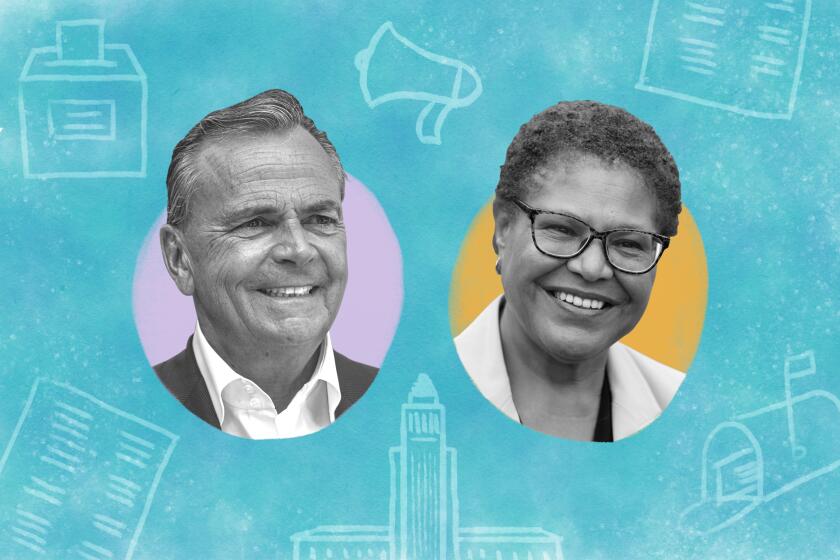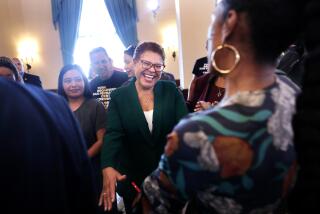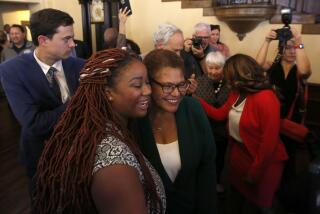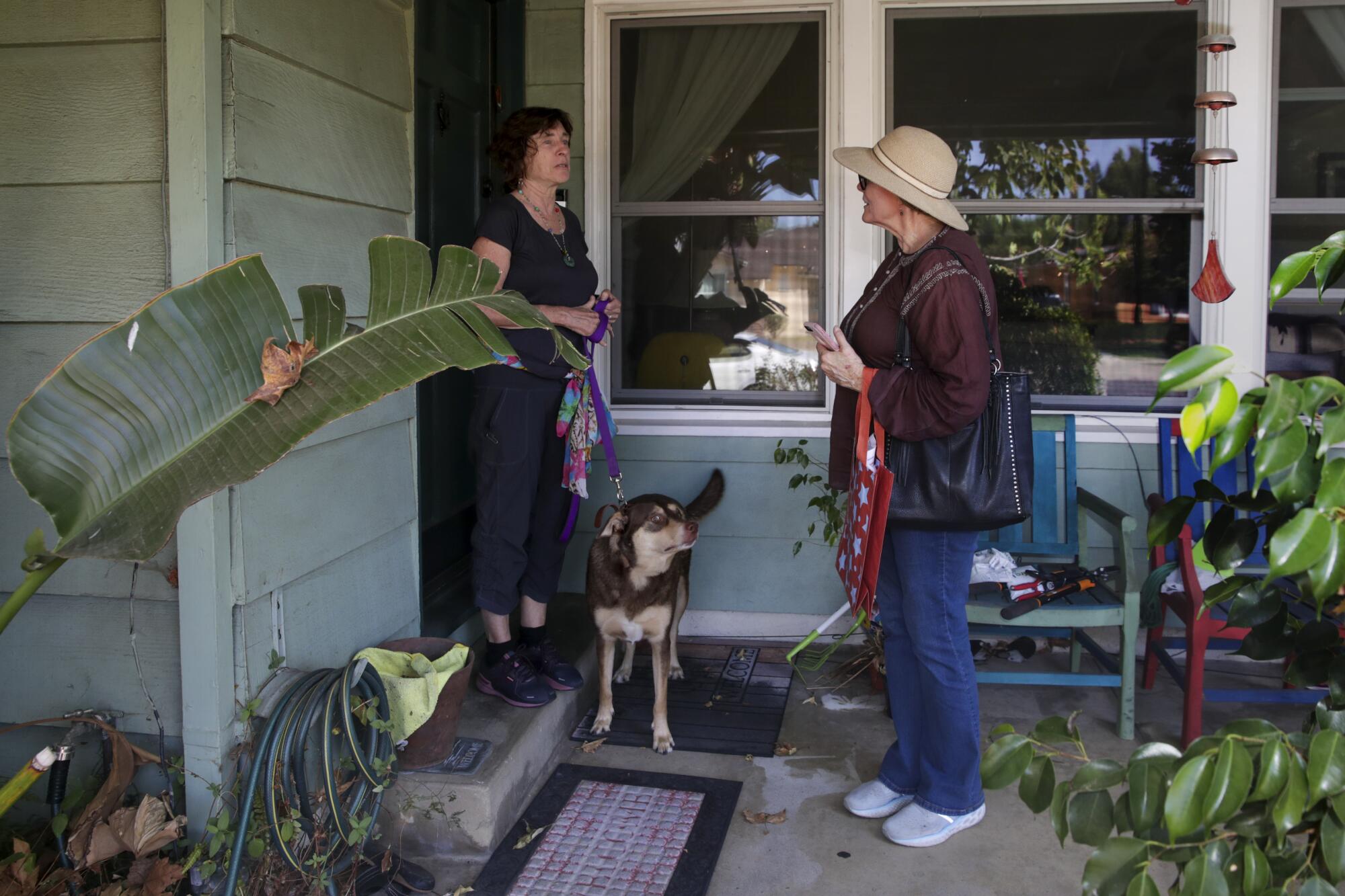
- Share via
One of Rick Caruso’s first developments was a mall in Encino. It opened in 1994 after the Northridge earthquake and turned what had been seen as an eyesore into something “compatible with the neighborhood,” as one resident put it.
Rep. Karen Bass was married for several years to a Cal State Northridge graduate from the San Fernando Valley, and they lived in the city of San Fernando for a time. Her work on protesting abuses by the Los Angeles Police Department regularly linked her up with activists from the area.
The two candidates for mayor are most closely associated with other parts of Los Angeles, yet each has deep personal or professional ties to the Valley. With 1.46 million residents — 38% of the city’s population — it could sway the election either way.
These votes are especially crucial for Caruso, who beat Bass in the Valley in the June primary but trailed her badly in most other areas of L.A. — losing citywide by 7 percentage points. His voter outreach operation, costing about $13 million at latest count, has focused intensely on the Valley.
But when canvassers and the candidates themselves press the flesh in the Valley, they encounter an electorate whose leanings don’t always line up with common perceptions.
Rick Caruso and Karen Bass are running for Los Angeles mayor. Here is your guide to the race.
Caruso, a wealthy developer who was registered as a Republican as recently as 2019, has found deep support in some of the Valley’s poorest communities, notably in heavily Latino areas in the northeast. Bass, for her part, outdistanced Caruso in the primary in whiter communities like Sherman Oaks and Studio City.
“I think people look at the Valley as a sort of monolith — one singular place where people are whiter and more conservative and that’s just not the case. It hasn’t been the case, arguably, since the ‘60s or ‘70s,” said Jeremy Oberstein, a Northridge resident and consultant who previously worked for Councilmember Paul Krekorian and Controller Ron Galperin and is supporting Bass.
In recent years, Oberstein and his wife, Serena, moved from Northeast Los Angeles and found a community that was more liberal than the Valley they had grown up in. As in most parts of city, homelessness and public safety animate political conversation — and because of its diversity, the Valley is an area where both candidates can credibly argue their base of support exists.
“The Valley is a microcosm of Los Angeles itself,” Oberstein said. “I think others are right, as the Valley goes, so will the election go.”
The region is about 46% Latino, slightly below the citywide total of 48%, and nearly half its residents are renters, reflecting decades-long demographic shifts.
It also accounted for 38% of ballots cast in the June primary, with Caruso defeating Bass by 7.5 percentage points among those voters. He picked up big support in areas with large Latino populations such as Sylmar and Pacoima — though turnout was lower in these neighborhoods.
But Bass appeared to close the gap over the summer. Times polling last month found that Bass and Caruso were essentially tied, 41% to 40%, among likely voters, though Caruso led, 40% to 28%, among registered voters.
Bass finished ahead of Caruso by about 20 percentage points in South L.A., the Eastside and the central city, and by 7 points on the Westside. So running up the score in the Valley is essential for Caruso, who needs to capitalize on a discontent over homelessness and public safety that exists in certain parts of the Valley and resembles anger across the city.
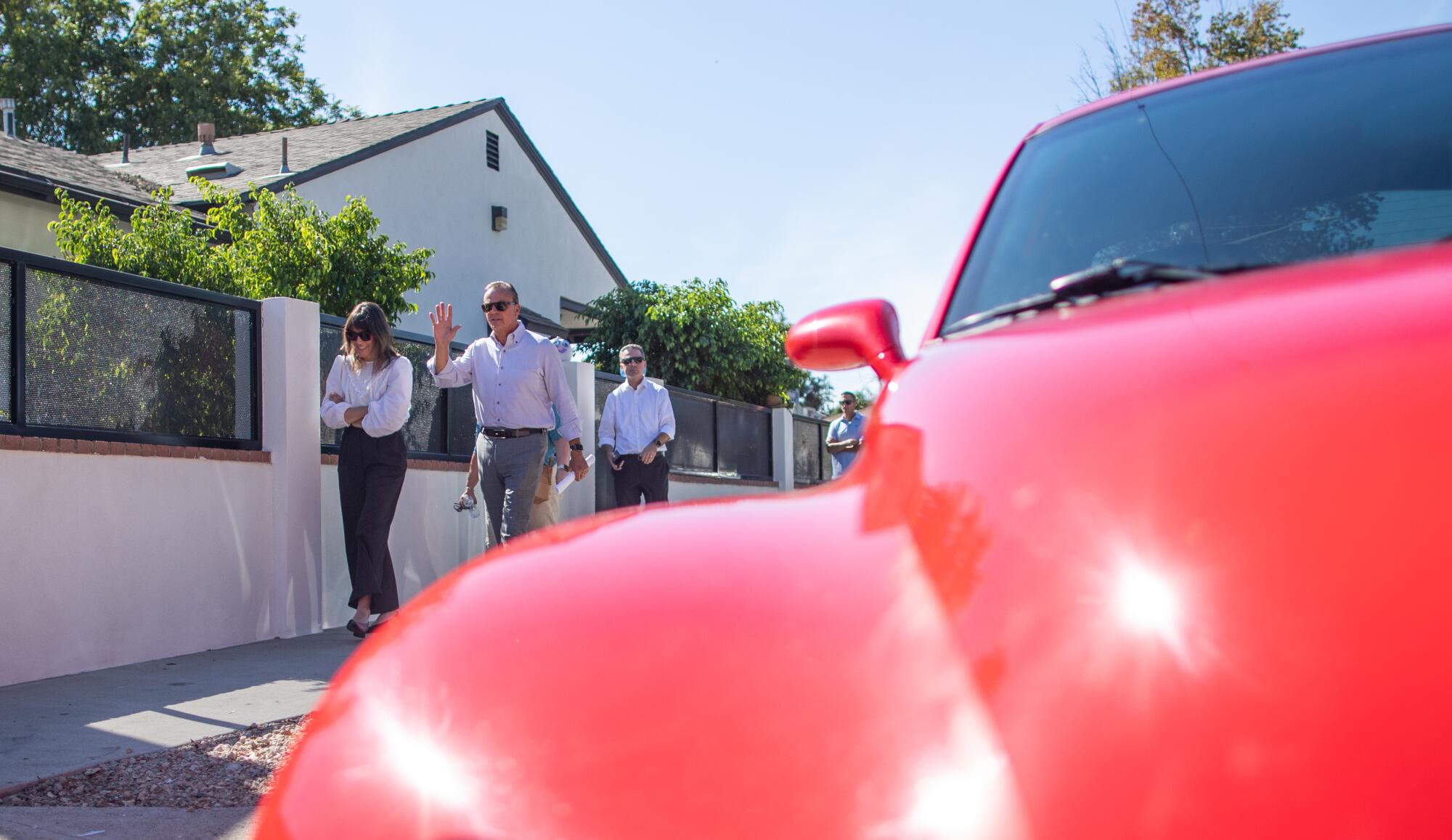
Capturing that frustration is one thing. Then there’s ensuring that these supporters actually vote. To do that, Caruso has spent big money on a canvassing and voter outreach operation and hired 300 to 400 door knockers across the city, at $25 to $30 an hour.
There’s also an extensive phone bank operation where 30 to 40 people at several locations across the city are making calls in Spanish, English, Armenian and other languages.
“Our main opponent has been voter apathy — more than anything else,” said Dveen Babian, a consultant who is helping coordinate the field program. “If we’re able to turn out the people that we’re trying to turn out, the support is there. We’re very confident about that. We just need to make sure that we turn out those groups.”
It’s why Lorena Plaschinski was walking a peaceful Sylmar block on a recent weekend last month, knocking on doors and coordinating dozens of other canvassers who were handing out Caruso campaign materials and reminding people when and where to vote.
Plaschinski is originally from Guadalajara, where she previously worked in sales for a tequila company. Primary turnout in the 7th Council District, which includes this block in Sylmar, was about 20%, roughly 10 points lower than the citywide total. Turnout was similarly lower than the rest of the city in the 6th District, which also includes areas of the Northeast Valley.
Many evenings she visits various parts of the Valley with her team and a cellphone app that tells her which doors to knock on. The day before she’d been in Panorama City.
On Berg Street one recent Sunday, Plaschinski wore camouflage pants and a Caruso shirt as she spoke with more than a dozen residents who said they supported the developer, only one of whom had turned in their ballot for the Nov. 8 election.
Adrian Lozano, 46, who does maintenance for the Los Angeles Unified School District, said he has seen Caruso ads on YouTube and on television and was attracted to his wealth because it meant “no one will own him.” He said he mostly votes Democrat, and planned to vote for Caruso because “we need more police.”
Plaschinski marked this down and moved on. At home after home, she heard some version of this refrain — a frustration over homelessness and an attraction to the candidate as he’s presented himself in millions of dollars of advertising.
A few days earlier, about two dozen volunteers gathered in the backyard of a Valley Glen home preparing to knock on doors for Bass. Trish Dexter, 66, sat in a lawn chair nursing a sore foot from canvassing. The Valley native and Granada Hills High School alum had been out most weekends recently canvassing for Democratic candidates.
She became much more involved in politics during the Trump presidency through a program that connected volunteers in deep blue Los Angeles County to nearby swing districts to help Democrats campaign.
Get the lowdown on L.A. politics
Sign up for our L.A. City Hall newsletter to get weekly insights, scoops and analysis.
You may occasionally receive promotional content from the Los Angeles Times.
“Why aren’t we supporting our nearby friends in the districts nearby that are Republican?” she said of this work.
In an interview, Bass said that this effort, which she aided through a super-PAC she founded, may also have upped her prominence in this part of the city.
“So it started with people in my district, but it became much bigger than that,” Bass said of this effort to help candidates like former Rep. Katie Hill. “It was about helping Democrats in the districts. They knew me and knew of my work from there.”
Her operation relies much more heavily on volunteers than Caruso’s, but also includes about 75 paid field staffers spread out through the city who “are knocking on doors and calling voters six days per week,” said Bass spokesperson Sarah Leonard Sheahan. Unions supporting Bass have also been doing canvassing in this part of the city.
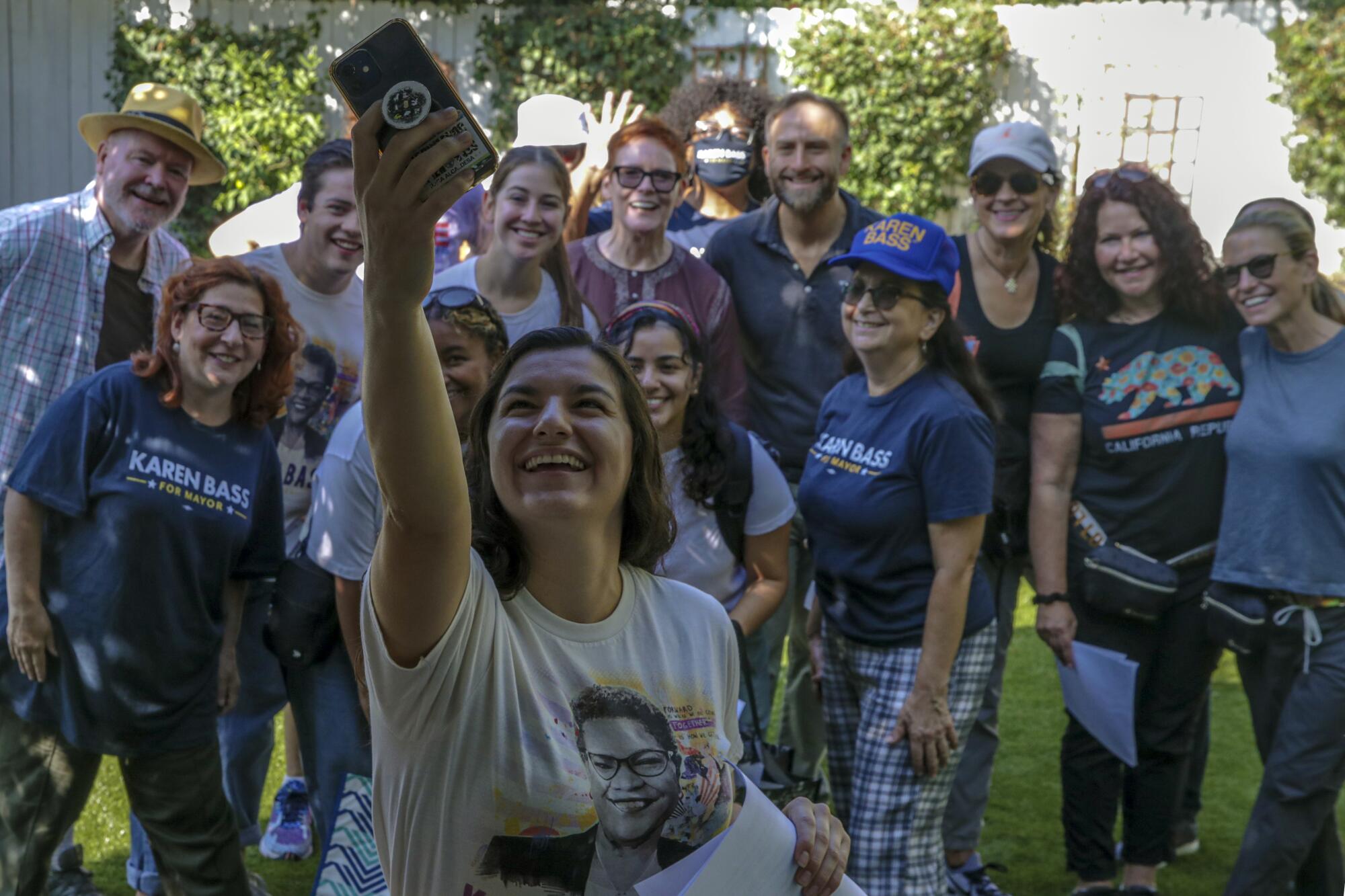
On this Saturday afternoon, Dexter paired up with a stranger who represents a shift that has also helped Bass.
Yale Chasin works in the film industry and moved in recent years to Studio City with his wife and young daughter. They were out of town and he jokingly said that in order to stay out of trouble he’d go canvassing for Bass, because “I felt the strong sense of a dystopian possibility of Rick Caruso as mayor.”
In Sherman Oaks, Chasin and Dexter saw signs of Caruso canvassers’ presence with literature underneath doors or the stray remark from a neighbor who said they’d been the day before. Unlike in the Northeast Valley, during their morning stroll over several hours, they found a decidedly more mixed batch of support, with Caruso supporters living next to Bass backers.
A man who gave his name only as Peter walked his dog Buddy and struck up a conversation with the canvassers. He said above all else homelessness would be the issue on which he decides to vote. Still undecided, he said that “we’ve had enough mismanagement.”
At a nearby home, a shirtless man stood on his second floor balcony, and upon hearing Chasin and Dexter were there for Bass, held up a thumbs down and told them to buzz off. At each home, Dexter told whoever would listen that Bass had a plan to address homelessness and that having a developer in charge was like “putting a fox in the henhouse.”
At one final house Dexter met a man whose kid had gone to school with her son. They caught up and she made her same pitch. It included how Bass would leverage her relationships to bring home resources to help address homelessness.
The man listened and sighed. He planned to vote and was likely going to support Bass, partly because of Caruso’s past Republican affiliation. But he wasn’t terribly enthusiastic.
“I feel pretty cynical about the whole thing,” he said.
Times staff writer Sandhya Kambhampati contributed to this report.
More to Read
Sign up for Essential California
The most important California stories and recommendations in your inbox every morning.
You may occasionally receive promotional content from the Los Angeles Times.
